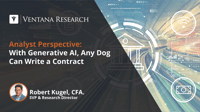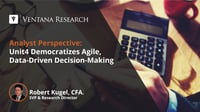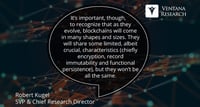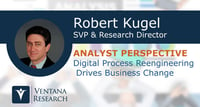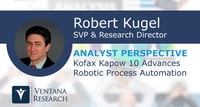This title plays on the now-ancient meme from the 1990s: “On the internet, nobody knows you’re a dog,” which pointed to a challenge of anonymity posed by new technology. In this case, though, I’m using it to highlight an opportunity that generative artificial intelligence presents in streamlining routine business functions that require some level of individual skill and experience to handle. Ordinary contracts are just one example of work products that require humans to create, edit, analyze,...
Read More
Topics:
Office of Finance,
Digital Technology,
digital finance,
AI & Machine Learning,
robotic automation,
Generative AI
Unit4’s Financial Planning and Analysis (formerly Prevero) is a planning and budgeting application designed for the requirements of midsize corporations and the public sector. These organizations are challenged in buying software because they have almost all the requirements of larger enterprises but have a smaller budget and limited technical resources.
Read More
Topics:
Office of Finance,
embedded analytics,
Analytics,
Business Intelligence,
Business Planning,
Financial Performance Management,
Price and Revenue Management,
Digital Technology,
ERP and Continuous Accounting,
collaborative computing,
AI & Machine Learning
In late February I attended Spark, the Scout annual user group meeting. This was the third and likely the last such meeting, as Scout was recently acquired by Workday. Scout’s users represent a new breed of purchasing managers and executives looking to change the role of the purchasing department. This change is critical for businesses. Saving money is the essential job of sourcing and purchasing departments. But departments can go far beyond that, helping support product and go-to-market...
Read More
Topics:
Office of Finance,
expense management,
Financial Performance Management,
Digital Technology,
Digital Commerce,
Operations & Supply Chain,
Enterprise Resource Planning,
ERP and Continuous Accounting,
purchasing,
sourcing
The traditional office of finance has five main organs: accounting keeps the books; financial planning and analysis (FP&A) analyzes performance and manages the forward-looking activities of the company such as planning, budgeting and forecasting; corporate finance raises outside money; treasury takes care of the cash and bank accounts, and tax. The modern office of finance requires a sixth: Finance IT (FIT).
Read More
Topics:
Office of Finance,
Analytics,
Financial Performance Management,
Price and Revenue Management,
Digital Technology,
Operations & Supply Chain,
ERP and Continuous Accounting,
blockchain,
robotic finance,
Predictive Planning,
Conversational Computing,
revenue and lease accounting,
collaborative computing,
Subscription Management,
AI & Machine Learning
By itself, data isn’t useful for business; the application of analytics is necessary to transform data into actionable information. Data analysis of one sort or another has long been a core competence of finance departments, applied to balance sheets, income statements or cash flow statements. Today, however, Finance must go beyond these basics by expanding the scope of the data being examined to include all financial and operational information that can yield actionable insights. Analysis thus...
Read More
Topics:
Customer Experience,
Human Capital Management,
Marketing,
Voice of the Customer,
business intelligence,
embedded analytics,
Learning Management,
Analytics,
Collaboration,
Data Governance,
Data Lake,
Data Preparation,
Information Management,
Internet of Things,
Contact Center,
Data,
Product Information Management,
Sales Performance Management,
Workforce Management,
Financial Performance Management,
Price and Revenue Management,
Digital Technology,
Digital Marketing,
Digital Commerce,
ERP and Continuous Accounting,
blockchain,
natural language processing,
robotic finance,
Predictive Planning,
candidate engagement,
Intelligent CX,
Conversational Computing,
Continuous Payroll,
revenue and lease accounting,
collaborative computing,
mobile computing,
Subscription Management,
agent management,
extended reality,
AI & Machine Learning
Identity management is an old problem that has taken on new dimensions in the digital world. In 1993, at the dawn of the World Wide Web (WWW),The New Yorkerran a cartoon featuring two dogs talking, one perched in front of a computer. The caption reads: “On the Internet, nobody knows you’re a dog.” The phrase quickly evolved into a meme highlighting the issue of identity uncertainty in the new digital environment.
Read More
Topics:
Human Capital Management,
Office of Finance,
Learning Management,
Internet of Things,
Data,
Workforce Management,
Digital Technology,
ERP and Continuous Accounting,
blockchain,
candidate engagement
IBM’s THINK conference, just held this February in San Francisco, is IBM's annual user conference. THINK is designed to showcase upcoming product updates and releases from IBM, along with provide best practices on a wide range of topics. While many technologies were on display, there is one topic in particular I wanted to cover this year: Blockchain.
Read More
Topics:
Office of Finance,
IBM,
Financial Performance Management,
FPM,
Digital Technology,
blockchain
Blockchains are attractive because their built-in security and trust factors make them useful for almost all business interactions involving organizations and individuals. Blockchains have two basic functions. One is as a method for handling transactions involving property such as land deeds, trademarks or other assets. The second involves exchanges of data such as identities of individuals or businesses, the location of an object at a point in time or weather conditions. All interactions...
Read More
Topics:
Big Data,
Data Science,
Mobile,
Marketing Performance Management,
Office of Finance,
Analytics,
Business Intelligence,
Cloud Computing,
Data Governance,
Data Integration,
Data Preparation,
Internet of Things,
Digital Technology,
Digital Marketing,
Digital Commerce,
Operations & Supply Chain
Business process reengineering was a consulting fashion in the early 1990s that spurred many companies to purchase their first ERP systems. BPR proposes a fundamental redesign of core business processes to achieve substantial improvements in market and customer responsiveness, productivity, cycle times and quality. ERP systems support business process reengineering by guiding the step-by-step execution of the redesigned process to ensure that it is performed consistently. They also automate the...
Read More
Topics:
Big Data,
Data Science,
Mobile,
Customer Analytics,
Customer Experience,
Machine Learning,
Office of Finance,
Wearable Computing,
Continuous Planning,
business intelligence,
Analytics,
Cloud Computing,
Data Integration,
Internet of Things,
Financial Performance Management,
Digital Technology,
Digital Marketing,
Digital Commerce,
Operations & Supply Chain,
Enterprise Resource Planning,
Machine Learning and Cognitive Computing,
ERP and Continuous Accounting,
Sales Planning and Analytics
Kofax offers Kapow, robotic process automation (RPA) software used to acquire information from a range of sources without human intervention and without having to write code. These sources include websites, applications, unstructured documents, data stores and desktop spreadsheets. RPA software does repetitive, low-value work that otherwise may be performed by person. It saves time in these tasks, completing them sooner and freeing skilled individuals to concentrate on work that utilizes their...
Read More
Topics:
Office of Finance,
Operations,
close,
finance,
banking,
Digital Technology
